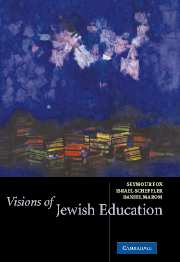Book contents
- Frontmatter
- Contents
- Preface and Acknowledgments
- About the Mandel Foundation
- Introduction
- Part I The Visions Project
- Part II Visions in Detail
- Introduction
- 4 What Must a Jew Study – and Why?
- Supplement: Isadore Twersky
- 5 Jewish Studies in Israel from a Liberal-Secular Perspective
- Supplement: Menachem Brinker
- 6 We Were as Those Who Dream: An Agenda for an Ideal Jewish Education
- Supplement: Moshe Greenberg
- 7 Reflections on the Educated Jew from the Perspective of Reform Judaism
- Supplement: Michael A. Meyer
- 8 Educated Jews: Common Elements
- Supplement: Michael Rosenak
- 9 The Concept of the Educated Person: With Some Applications to Jewish Education
- Supplement: Israel Scheffler
- Part III Visions in Context
- Conclusion: The Courage to Envision
- The Visions Project: Participants and Forums
- Index
4 - What Must a Jew Study – and Why?
Published online by Cambridge University Press: 08 January 2010
- Frontmatter
- Contents
- Preface and Acknowledgments
- About the Mandel Foundation
- Introduction
- Part I The Visions Project
- Part II Visions in Detail
- Introduction
- 4 What Must a Jew Study – and Why?
- Supplement: Isadore Twersky
- 5 Jewish Studies in Israel from a Liberal-Secular Perspective
- Supplement: Menachem Brinker
- 6 We Were as Those Who Dream: An Agenda for an Ideal Jewish Education
- Supplement: Moshe Greenberg
- 7 Reflections on the Educated Jew from the Perspective of Reform Judaism
- Supplement: Michael A. Meyer
- 8 Educated Jews: Common Elements
- Supplement: Michael Rosenak
- 9 The Concept of the Educated Person: With Some Applications to Jewish Education
- Supplement: Israel Scheffler
- Part III Visions in Context
- Conclusion: The Courage to Envision
- The Visions Project: Participants and Forums
- Index
Summary
Introduction
This essay has two purposes: Its first purpose is to propose foundational ideas, paradigms, and insights from a distinct educational philosophy that emerges from Maimonides' writings in various contexts – to specify its guidelines as to curriculum and pedagogy; to draw an ideal portrait of the teacher and the student and the relations between them; and to identify and extol values and trends in a religious education that is centered on the Torah. We will attempt to explicate a worldview that is anchored first and foremost in the writings of Maimonides (although we will also need to refer to other authoritative legalists and thinkers in order to complete or complement his formulations), and on which it is possible to base a comprehensive educational system. It is a great challenge to understand and explain the centrality of halakhah (Jewish law) and its role, and then to chart the reciprocity of learning and observance. While education is the focus of this essay, additional aspects of Maimonidean thought are obviously essential to this inquiry.
The essay's second purpose is to illuminate for educators and students – including those who do not presently identify with the spiritual-cultural content or the moral-intellectual framework of halakhah – portions of the Jewish tradition, the Judaism that, in the course of generations, shaped our historical existence and our cultural-national character. Every person ought to take an interest in these ideas, whether because he accepts them or because he feels a commitment to know Judaism and Jewish history.
- Type
- Chapter
- Information
- Visions of Jewish Education , pp. 47 - 76Publisher: Cambridge University PressPrint publication year: 2003
- 4
- Cited by



